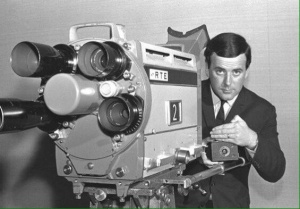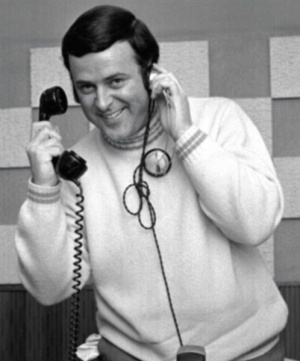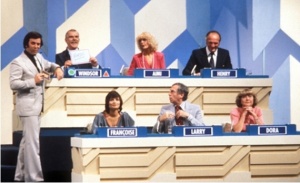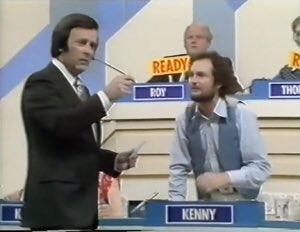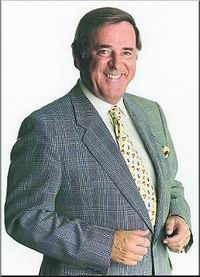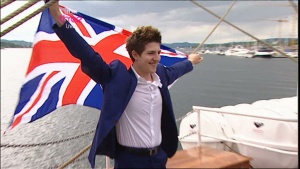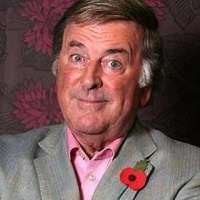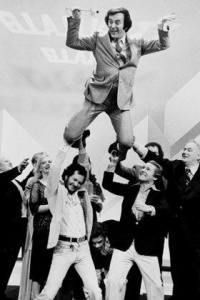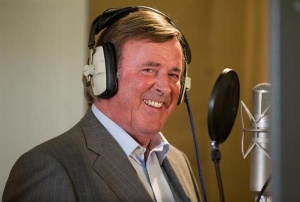Weaver's Week 2016-02-07
Last week | Weaver's Week Index | Next week
A legend in his own breakfast time.
Contents |
Terry Wogan
1938—2016
- "Behind the creamy Irish charm and the deceptively casual manner, there is a skilful broadcaster, an intelligent man who has always taken a careful and realistic view of himself and his career." – Ian Trethowan
Born in Limerick in 1938, the young Terry attended Crescent College and later Belvedere College in Dublin, an austere Jesuit establishment. He played rugby, he excelled in acting and Latin, he joined a local musical society. Wogan was always literate – his style was pure Wodehouse, his delivery owed to Flann O'Brien.
From school, Wogan had five years in the world of banking, before joining Irish broadcaster RTÉ. He presented documentaries, read the news, covered the visit of President Kennedy. Later, he moved on to the quiz show Jackpot. We've not been able to find a copy of this programme, still less see it, but by all accounts it worked as a vehicle for Terry's bonhomie and his ability to put people at their ease.
Wogan married his wife, Helen, in 1965. It was a wet Saturday in Rathmines, the start of a golden half-century for the couple. She survives him with two sons and a daughter; their firstborn daughter died in infancy.
To England!
- "Hullo, I'm Terry Wogan – so, it's yer first shift eh? Well don't worry, we're a nice friendly bunch here – we'll get you through it OK"
Dubbing a demo, Wogan sent his tape to the BBC in London. But all was not well. Wogan's had sent one of those massive reel-to-reel tapes, and he hadn't rewound the tape after checking it. So when the producer put the tape on to play it, he found that Terry was talking backwards, and upside down. "He'll have no problem talking up to the pips," thought the producer.
Then he rewound the tape, played it in the normal way, and still employed the young Wogan.
Midday Spin was his first programme, a selection of records on the Light Programme, presented down the line from RTE in Donnybrook. He was commissioned for Late Night Extra, once a week on both Radio 1 and Radio 2; then deputised for Jimmy Young. Wogan was a few years older than the other Radio 1 jockeys, he wasn't part of the gang including Blackburn and Rosko and Hamilton. An afternoon show on 1 and 2 followed in late 69, followed by the Radio 2 breakfast programme in 1972.
Wogan was meticulous in his lack of preparation. Of course, he knew what the world was doing, and when to take the traffic report. But scripts were for other people. Wogan's metier was his wordcraft. He would take a mundane thought and turn it into an object of adoration. Endlessly quotable, yet with barely a catchphrase.
Listeners wrote in to suggest things to talk about. Which is a bit like saying that Wogan liked a game of golf. The listeners helped him to shape a surreal world, similar to our own, but with enough differences to know that he was always being sarcastic.
Now, Wogan wasn't the only presenter to inhabit a world of his own, Noel Edmonds broadcast his Radio 1 programmes from Perkins Grange, and would later move to the similar Crinkley Bottom. Brian Perkins, the owner of the titular Grange, would turn up on Radio 4's Dead Ringers as a Mafia-style hitman. But both Noel Edmonds and Dead Ringers had a limitation: they controlled the joke. When Noel wanted to make a point, he would make it, and you would laugh at it. When the Dead Ringers crew wanted to send up a show, they sent it up in the way they found funny. It was ever-so-slightly forced, a little bit didactic.
Wogan's genius was to keep the listeners with him. He'd offer up images and caricatures of his co-workers, or he'd read out and build upon something the listener had sent in. He would know when something worked, the postbag would build upon the joke. By omission, he would know when a conceit wasn't working, or when it had run its course. In the years since, perhaps only Danny Baker combines a way with words with an innate sense of timing.
Back in the real world, Wogan was the antidote to the bomb-throwing exploits of the IRA. His was the voice of the sane Irishman, the people who believed in talking things through rather than blowing up everyone who disagrees with you. The emotional fools who believed in locking up anyone with a drop of Irish blood had to explain why they'd take that nice Mr. Wogan out of life.
Blankety Blank
- "I've just heard that Jimmy Young's OBE award was delayed. It was originally put forward for the birthday honours of Queen Blank."
Elsewhere on the wireless, Wogan was a regular guest on panel shows, with a particular recurring role on The Year In Question (1). As well as the programmes on Radio 1 and 2, he presented Lifelines, an adult education series on Radio 3. There was Wogan's World on Radio 4, and Five At Barcelona on Radio 5. Very few people host on all five networks.
On the television, Wogan hosted Come Dancing, the inter-town ballroom dancing competition. He presented Miss World, a beauty contest on the BBC. And he presented Britain's version of The Match Game. Given the crisis in BBC funding, it was remade as an absurdist game show with a budget of approximately nothing.
Blankety Blank was a very simple game. Here is the setup to a joke. Can you supply the punchline? Or which punchline will you choose from two or three options.
Winners might walk out of the studio with the teasmade (£7.50 from British Home Stores), or a new Raleigh bike (£25 from Shoppers World). Losers get the consolation prize of a Blankety Blank cheque book and pen (£80 from BBC Props).
We remember Blankety Blank for Kenny Everett bending the mike (after the first time, a cheap imitation attached to a par-boiled piece of BBC spaghetti.) But we forget that there were at least five other stars. Larry Grayson and Isla St Clair promoting The Generation Game, David Jason auditioning for Danger Mouse, and Barbara Windsor showing her talents.
We remember the unruly panellist, but we forget that the rest of the panel were like giggling schoolchildren confronting a particularly inept substitute teacher. We remember the "Ready!" signs, but forget that the panel had to get there, and Wogan had time to fill while some of them messed about. We remember the high-tech scoreboard, little signs operated by the panel and the contestants. Literally no expense spent.
The BBC of 1980 preferred to spend its money on foreign drama. The soap opera Dallas was one of their favourites, and it became one of Wogan's favourites. For his listeners, and for him, the grand plots were meaningless. They'd pick up on the little details, like Sue Ellen’s permanently quivering lip. Successor soap Die Nasty faced similar, merciless ribbing. So did ITV's schlock detective drama Midsomer Murders. Viewers were watching the show, if only to share in the jokes afterwards. Such "so bad it's good" shows only worked when we had a few channels to watch, not the plethora of choice we have now.
The BBC's annual appeal for Children in Need of Assistance had been running since the invention of the BBC. In 1980, it took over the bits between the shows; in 1984, it took over the evening for song and dance and stunts and silliness and raising funds. An unflappable host, Wogan did his bit to raise £790 million for good causes.
Wogan's commitment to good causes didn't stop when the lights went out. He was on the board of trustees for Children in Need, making sure that the money went to good places, and sometimes popping up on the projects to sprinkle a slice of stardust.
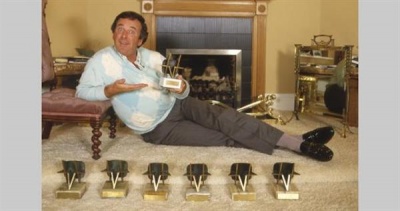 The TV Times named Wogan their Television Personality of the Year for ten consecutive years from 1979.
The TV Times named Wogan their Television Personality of the Year for ten consecutive years from 1979.
Chat show
- "You don't need to know how a wheelbarrow works to push it."
Wogan, the early evening chat show, ran from February 1985 to July 1992. Three nights a week, it filled the slot at 7pm now occupied by The One Show. It was a smooth production, Wogan would move from guest to guest, often asking them innocent little questions that didn't let them plug the book or the film they'd like to talk about. Bette Davies, for instance, spent five minutes in what she thought was idle chit-chat before she got to flogging the book.
One example – and we saw it again only a few weeks ago – was Wogan's talk in January 1990 with Margaret Thatcher. Just the two of them, in front of an almost-silent audience, a toe-to-toe battle conducted with extreme courtesy for forty minutes. By the standards of Brian Redhead, Robin Day, Jeremy Paxman or John Humphrys, it was a soft interview. But in the naivety, we could see the prime minister relaxing, and then letting her human face show. Just a crack, just the tiniest vulnerability.
More often, the guests hoped to have some of Terry's stardust rub off on them. It was disposable television, "chewing gum for the eyes", according to the host. On a good day, the guests could sparkle and joust with the host. He'd fall for the innuendo, make the guest look good, and introduce a rising band. On a bad day, he'd be lumbered with dull guests and the snoring sounds of Reg 'Reg' Snipton. On a really bad day, the guest has been suitably refreshed with BBC hospitality, and is completely incoherent. Let that be a lesson: never hit yourself over the head with slices of BBC coffee.
There was an effort to take the Wogan show to the Americans. The Disney company wined and dined the Wogans and their producer for a week. It came to naught, the Disney people didn't get the point of the Wogan schtick. The host intended to leave the show in 1991, but was persuaded to stay on for another year. He didn't know that the delay was to build the set of that very successful soap opera Eldorado (1992-3).
The Eurovision Song Contest
- "You couldn't just hear his voice, you could hear his eyebrow" – Ryan Tubridy.
After a run of success in the late 1960s, the BBC took the Eurovision Song Contest in a very earnest fashion. Wogan turned up in 1970, and did the commentary with the same wry approach he took to everything. It's a foolish spectacle that you didn't want to be taking too seriously. As the years wore on, and the contest became increasingly detached from popular song, Wogan had a point. Skewering the 2001 hosts as "Dr Death and the Tooth Fairy" was acerbic, but he had a point – delivering the entire show in rhyming couplets was always a fool's errand.
But he became set in his ways, this was the one engagement where Wogan failed to roll with the times. He didn't recognise that, to the Eastern Europeans, Eurovision was important, the one night of the year when they could be treated as an equal with Germany or Russia or the UK. Goodness, it's the one night of the year when people remember that Bosnia-Herzegovina or the Former Yugoslav Republic of Macedonia actually exist.
And he didn't recognise that televoting would mean that Eurovision would become a song contest of popular songs once more. Wogan could have retired from Eurovision at any time, and perhaps 2003 was the year to leave. The BBC had botched the selection process, and put forward a number spectacularly poor even by their own low standards. Wogan was apologising for the poor result from the off. The naff number was performed badly, and the UK scored no points at all. It was lucky to do that well. But Wogan stayed put, and the BBC continued to make the same mistakes. Naff number, poor staging, adequate performance, and rarely above the bottom quarter.
The 2008 contest was marred by technical problems, suffered from poor shot direction, and none of the entries particularly deserved to win. In the end, RTR's "Believe" was judged least bad, and it was clear that televoting had turned into "in the absence of anything good, vote your cultural affinity". Wogan was not best pleased, and pretty much resigned, live, on air.
Wogan's legacy at Eurovision is manifold. The UK has suffered from years of misinformation, still believes that no-one cares, and has still to fully shake off Wogan's legacy. But he was an obvious excuse to bring in some jury scores, introduced for the 2009 final, and now generally accepted to find a worthy winner every time. Almost by accident, Wogan changed Eurovision for the better.
Return to breakfast
- "He makes the nation feel at ease with itself" – John Humphrys
After ending the Wogan chat show, Terry returned to the radio. His afternoon programmes enlivened dead hours at the Barcelona sporting event in 1992, just as they had done in Los Angeles and Montréal before. And in 1993, Wogan was back at Radio 2. His successors had all moved on – Ken Bruce found Wogan a tough act to follow, Derek Jameson much more boisterous, Brian Hayes hopelessly miscast.
First by letter, later by email, Wogan kept in touch with his listener. Indeed, Wogan might have done more than any other broadcaster to harness the internet for the average person. When this column volunteered at internet taster sessions around the turn of the century, so many people wanted to see the Wogan page. Many sent him their first email.
Paul Walters, his producer, won a short commission for a lunchtime programme. Wogan's Web bamboozled BBC1 viewers for a month in 1998. It was, essentially, Wogan's radio show brought to the television, without the records.
Wogan used his radio show to bring talent to the world. His biggest find was Eva Cassidy, a pure-voiced singer who had died of cancer five years earlier. Wogan and Walters nurtured country music, giving Mary-Chapin Carpenter, The Shires, and Gretchen Peters a certain level of fame here. Wogan may have done more to promote women in country music than the combined efforts of every radio host in the States.
And he was shockingly rude, the "Janet and John" stories are innuendo from start to finish. He knew when to be quiet, when to let one of his co-presenters have the last word. He knew when to drop a bad pun, and when to mock himself for that pun. Wogan wasn't challenging, but that wasn't a problem: while there are weathervanes blowing hot air on Radio 4, we need a signpost on Radio 2.
And he was effortlessly charming. Being Irish, he was less reserved than the British people. While the Brits are diffident, the stereotype of Irish people is that they'll give an opinion on anything. Keeping the Irish accent gave him a license to be louder, more upfront. He could deliver sharp criticism, never more apparent than with "dear old Auntie". Much more than the out-takes compilations Auntie's Bloomers.
Terry was always a critical friend of the BBC. When his Radio 2 colleague Ray Moore died, his eulogy began. "Good to see you’re all here on the front row to celebrate the life of Ray Moore – by-passed more times than Kingston." He chastised the new director-general Johnny Burke for his obsession with focus groups, and wondered why the Sports unit was moving to Salford in time for a summer of sport in London.
He remained with the corporation until the end, and honoured television handcuffs preventing him from working for other channels during the 1990s. His show Terry and Gaby (Channel 5, 2003-4) was an entertaining alternative to ITV's This Morning. Channel 4 found Wogan's Perfect Recall (see the Week of 7 September 2008) one of the few afternoon quizzes worth renewing.
Get off the beach before the tide comes in
- "If the present Mrs. Wogan has one fault, it's that she's a hoarder. She never throws anything out. Which may explain the longevity of our marriage."
After he left the breakfast show, Terry continued to present a Sunday show on Radio 2. He also found time to host Never Mind the Buzzcocks. No rehearsal, just turned up, had a look through the jokes, edited one or two. Then went out and hit it for six. The recording was done in an hour, and ended with a standing ovation in the studio.
He loved to support and encourage people around him. His successor on breakfast, Chris Evans, added a million listeners in his first ratings figures. Wogan didn't need to call Chris and make congratulations himself, but he did.
The jobbing broadcaster's last Radio 2 Sunday show was made on 8 November. He'd already filmed sketches for that Friday's Children in Need appeal, but had to miss the telethon through illness. Terry Wogan died last weekend.
This Week and Next
"It's a film about two dudes who have lost their car." Ah, how we love Brain of Britain, when they explain pop culture to each other.
Tip-off week for Channel 4's The Jump, now going out just once a week. The opening edition really dragged: formulaic introduction pieces were predictable. People sliding down a hill on a tea-tray just doesn't make for good television, not when we're seeing it 12 times in an hour. The weather didn't help: strong winds meant they couldn't use a proper ski jump, and had to use footage of the jump-for-height from the night before. This week's snow cross should be more fun. Emphasis on "should".
University Challenge continued its Interminable Group Phase. This prolix format, to reduce eight teams to four, is now in its seventh series. Every single year, Paxman has insinuated that it's difficult, or in some way confusing. Every single year, Paxman is wrong. So were the teams from Imperial and Nuffield Oxford, picking up three penalties for incorrect interruptions in the opening few minutes, and further missignals as the match progressed.
Had Imperial put their minds to it, had Imperial got these gambles right, they would have been out of sight by halftime. Had Paxman not been such a closed-minded sexist, he would have recognised Helle Thorning-Schmidt as a politician in her own right, and not as "Mrs. Kinnock", the wife of the present MP for Aberavon. In the last five minutes, Imperial did get their gambles right, and emerged winners by 190-85. Doesn't reflect the balance of the game, Nuffield were better than that.
Still on closed-minded sexists, slapped wrists to the question writers on The Getaway Car. "Name clubs that have competed in the football Premier League", they asked this week. According to the commentators, "Lincoln City have never been in the Premier League." Hogwash, they've scaled the heights against Liverpool, Blackburn, and Bristol Academy. The fault is sloppy question writing: if you mean the men's Premier League, say it.
This week's edition of Mastermind might be subtitled "I'm Sorry I Haven't a Pass". In eight rounds of questions, eighteen minutes of quick-fire quizzing, there was an answer to every single question. We don't recall that ever happening before.
Not all the answers were right. The winner, giving the most correct answers, was John Savage, who came from fourth to first. Three points off the pace after his specialist round on Jock Stein, the contender scored an exceptional general knowledge round to finish on 26 points. Even if he'd come last, that would have been enough to reach the semis. Then he saw Aidan Loy, Sarah Jane Bodell, and Wayne Stafford all drop points to finish well behind.
That 17 points is the best general knowledge score of the series. John looks a strong contender when the second round begins next week.
BARB ratings in the week to 24 January.
- Call the Midwife headed the ratings, on 9.75m viewers. ITV's BBC The Voice of UK was the top game, with 7.4m.
- Pointless Celebrities came second amongst games, with 5.25m, and Ninja Warrior recorded 3.85m.
- Take Me Out (2.85m) was embarrassed. It was beaten by University Challenge (3.2m), The Chase (2.91m), the Only Connect final (2.9m), and Celebrity Big Brother (2.95m).
- Good score for Mastermind, 2.15m, level with Catsdown. Lip Sync Battle settled to 1.9m, and Bit on the Side 1.2m.
- Top non-PSB game show was A League of Their Own (837,000), inches ahead of Take Me Out The Gossip (834,000), and The Voice on 3 (535,000). CBBC's The Dog Ate My Homework? A round 200,000.
A special run of Blankety Blank remembers Wogan (Challenge, Sun). Pocket Money Pitch looks to the future of business (CBBC, Mon). Next week's Week expects to look at Insert Name Here (BBC2, Mon), and it's the Ninja Warrior final (ITV, Sat).
Photo credits: BBC, RTE, Radio Times Archive, TV Times
To have Weaver's Week emailed to you on publication day, receive our exclusive TV roundup of the game shows in the week ahead, and chat to other ukgameshows.com readers, sign up to our Yahoo! Group.

